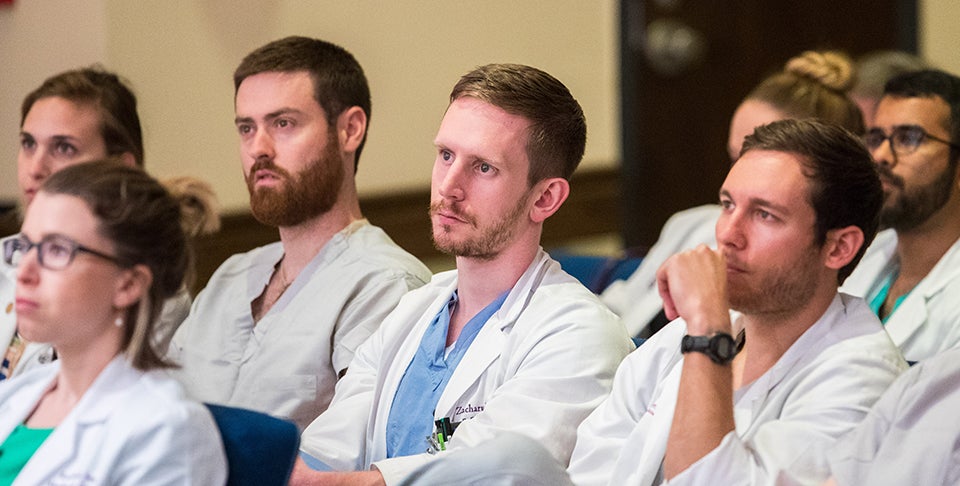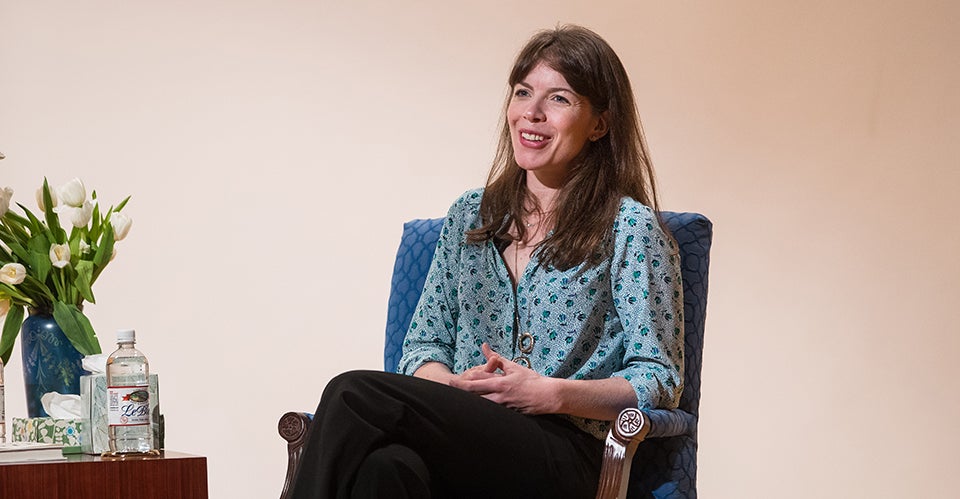WHAT REALLY MATTERS
Physician and widow of best-selling author shares lessons about living and dying well
Several hundred health sciences learners, faculty and staff from East Carolina University and Vidant Health converged on the Brody School of Medicine auditorium April 25 to glean inspiration from the widow of a best-selling author about what it means to live – and die – well.
In an on-stage conversation with Brody’s associate dean for student affairs, Dr. Susan Schmidt, internist and Stanford School of Medicine faculty member Dr. Lucy Kalanithi shared lessons she learned through the terminal illness and death of her late husband, Dr. Paul Kalanithi, author of “When Breath Becomes Air.”
Paul was chief neurosurgical resident at Stanford when he was diagnosed with stage 4 lung cancer at the age of 36. Also a gifted writer, he spent the last two years of his life becoming a father and writing a memoir about his experience as a doctor facing his own mortality, reflecting on the doctor-patient relationship and what it means to live in a meaningful way.
Lucy shepherded the book through publication after his death, and it has been on the New York Times bestseller list for more than a year.
In an interview prior to the presentation, Kalanithi said of her book tour, “It has been incredibly helpful to have other people connect with me in this time of grief and to be able to lean into that grief together. This is a way for me to reconnect with the world during a time when I would otherwise feel isolated, and it feels wonderful.”

Kalanithi met with Brody Scholars including third-year medical student Ismail Kassim for a small group discussion following her presentation.
During the presentation Kalanithi said that she and her husband were surprised to discover how much terminal illness can affect one’s sense of self.
“Much of a person’s identity and purpose is tied up in who they anticipate becoming,” she said. “It was tremendously helpful when Paul’s providers asked, ‘How can we help you rebuild yourself in a new way?'”
Kalanithi encouraged present and future health care professionals to help patients shape their care in a way that matches their values.
“That’s the pinnacle of what we’re doing in any medical profession,” she said. “Living longer at any expense is not the only priority people have … When we’re talking about dying with patients, what we’re really talking about is living well until you die and how their medical care supports that.”
Kalanithi described the overarching message of her late husband’s book as “The struggle to find meaning in our lives is the meaning in our lives. We’re all struggling to live out our lives toward whatever that thing is that provides meaning for us,” she said.
Brody and Vidant Health cosponsored Kalanithi’s visit in conjunction with National Healthcare Decisions Week in an effort to highlight the importance of advance care planning for end-of-life. Organizers hoped to urge individuals to consider and discuss their values and treatment preferences with their loved ones before a health crisis strikes.
“It’s about having a conversation with your friends and family regarding what matters to you in the big picture,” Kalanithi said. “An advanced care plan is more about love and family than a piece of paper.”
Following the presentation, fourth-year medical student and future pediatrician Bianca Patel said, “It made me feel good to hear her say that with every patient encounter we get more comfortable with this even if it isn’t happening to us firsthand. I will definitely use what I learned today. I’m impressed by her ability to share and enlighten us despite what she’s been through.”
Visit www.VidantHealth.com/AdvanceCare for information and tools to help with advance care planning.

Brody students listen as Lucy Kalanithi speaks about doctor-patient relationships during advance care planning.
